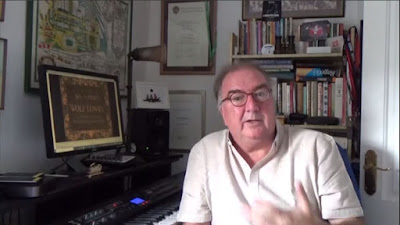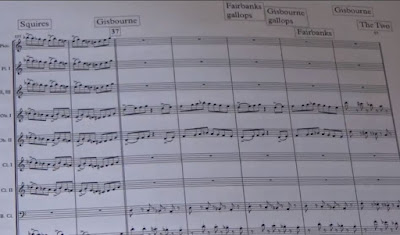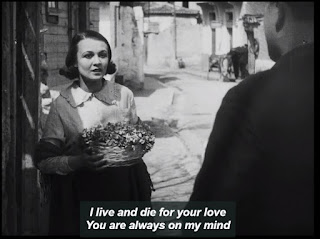Half-way through this “Limited Edition” of Le Giornate, Pordenonlineonly
as literally no one is calling it, it’s safe to say that the travel has
broadened our minds. From the mid-West on Saturday to actual China, then back
to an Americanised Sino-Japanese version, San Francisco and Italy, it’s been a
whirl and tonight we alighted in Greece for what I think is my first Grecian
silent.
Before Greece we took a trip to South London for Neil Brand’s
Masterclass, another must-watch session for all of us who want to understand
how these elite players accompany silent film with a piano, an audience, no safety
net and a century old partner that you may or may not have seen before let
alone rehearsed. He was, as ever, erudite and honest talking about his personal
commitment to the work
“Silent film music is a lie detector folks, people can
hear if you not into it because you start to sound inauthentic… I’ve always
felt that my job is to play the music from the inside out… taking an actor’s sensibility…”
 |
| Neil Brand abides |
This ties in to Philip Carli’s comments in yesterday’s
discussion, on playing being like acting and as Neil trained and worked as an
actor as well as a musician you can see why he’s so effective. The musician
places themselves in the heart of the film, taking up an improvised role and the
best accompaniment should feel as if it’s “coming out of the screen at you”.
In looking to connect his audience with the action Neil looks
for the common themes that still resonate across the gap between production and
viewing. This becomes ever more difficult as we develop our own “history” and I
would guess, the more that history is specific to the task in hand, Neil has
some four decades of silent film experience and when he first started playing
he naturally incorporated his own experience of film music by bringing the sensibilities
of The Dam Busters to a war film and so on… mixing scoring styles with
an awareness of both ends of the contemporary spectrum. This would seem to be
the way that music develops and will continue to do so with the influence and
incorporation of Zimmer thuds, Jóhannsson ethereality and Richter
sadness.
Neil talked us through the history of musical accompaniment
from the very earliest booklets suggesting themes for hard-worked pianists onto
the more specific instruction of play books and an actual score for Fairbank’s The
Black Pirate (1926). Music was always around silent film and for the Mabel
Norman film Mickey, 1918’s biggest smash, there was a song to promote
the film and vice versa, sheet music readily on sale to cash in.
 |
| Neil's score for Robin Hood with added notes for the conductor on how the action plays out |
Kevin Brownlow, David Gill and Carl Davies brought new
attention to silent films in the early 80s and Neil “rode the wave” helping to
change the view that silent film music was merely functional. Over this time a
lot of the films have been restored and look far better than the largely
unrestored prints; the old nitrate glow has gone but the films look incredibly
detailed and fresh.
eil then showed the William Hart film Wolf Lowry – featured
in last year’s Giornate – and it provided the perfect sample for Neil to show
how themes are established with the unfolding of character and narrative. Thirteen
minutes in and we can see how the story is going to go and the musical elements
are starting to come right out of the screen…
Again, another star turn from the accompanists, really
informative and Neil’s enduring enthusiasm shows exactly why he passed that “lie
detector test” every time I’ve heard him. He is usually too engrossed in the
process to remember much of what he has played and feels the responsibility of
honouring the “Ghosts on his shoulder”, the people who made these films. Every
time is different as inspiration coming off the screen comes in ways that can’t
be anticipated; unexpected turns in the narrative and performance that can change
the player’s mood. This job draws creativity and inspires Neil which is why he
loves “this job” and, we can hear it.
 |
| All that jazz in 1930 |
“The world is a lie
A deceitful dream
and till the last breath you take
Laugh and sing and never put evil in your hearts!”
Music was the inspiration for our main feature with Dimitrios
Gaziades’ The Apaches of Athens (Oi Apachides ton Athinon) (1930) being based on a 1921 operetta by
Nikos Hadjiapostolou with a libretto by Yannis Prineas who adapted it for the
screen and also acts in the film. Apaches was only rediscovered four
years ago in Paris and has been lovingly restored by the Greek Film Archive, the
Cinémathèque française, together with the laboratory L’Immagine Ritrovata in
Bologna. The result is a kind of Silent Musical with Ioannis Tselikas of the
Hellenic Music Centre in Athens, recreating the score, adding three new songs
and incorporating pre-existing recordings.
It’s a rousing love story and what strikes you very quickly
is not just the use of locations in Athens but the director’s choice to film in
some of the most deprived areas of the city. Greece was undergoing considerable
economic and political strife at the time and Gaziades’ positioning of actual
locations in this ostensibly light opera is telling especially as scenes of
wealthy living where also shot at the (temporarily) deposed King’s palace; maximum
contrast.
The film is all about class and the different worlds of the
rich and the poor, with our hero Pierre (Petros Epitropakis) a penniless “Apache”
known locally as The Prince for his joy de vivre. He gets paid to play the part
of the made-up fresh Prince of Mont-Athos in order to humiliate a nouveau riche
family and the message couldn’t be clearer; he’s more noble than they are.
“What a noble appearance from afar you can see he’s blue
blooded…” say women at the posh party when he arrives, appearance is all
and yet it’s what’s inside that counts and Pierre’s head will not be for
turning in the manner of many Hollywood musicals made post-Depression and
since.
The story starts with Pierre trying to scrump along with no
money along with his pals, Karkaletsos (Petros Kyriakos) and Karoumbas (the
multi-talented Yannis Prineas), cadging what they can in local cafes and
playing games with the local kids. Pierre is worshiped by local flower-seller
Titika (Mary Sayannou-Katseli) even though her mother doesn’t approve, and,
after an over-zealous “game” of stone throwing, she sneaks off to look after
him as he recovers.
 |
| Mary Sayannou-Katseli and Petros Epitropakis |
Meanwhile we meet a newly enriched family living among eye-rolling
servants at a palace on the hill, Xenofon Paralis (George Christoforides) and
his daughter Vera (Stella Christoforidou). His adviser Zenobe Kyriacos (Nik
Perdikis) has his eyes on handling more than Xenofon’s millions but his
daughter too and is distraught when his boss laughs off his attempt to secure
her hand.
Salty intertitles mock the “demanding pass-times of the nouveau
riche…” whilst Xenofon asks his secretary to decorate his empty bookshelves with
books, expressing no preference for author or subject matter. Clearly something
he’d need to be more careful about in these days of Zoom backgrounds.
Vera, who is somehow perfectly decent, falls off her horse out riding and, by chance, Pierre is there to rescue her. The two have an instant connection and it’s a true one as the hero rejects her offer of monetary reward, her safety being all he needs in return… Meanwhile Zenobe plots a grand revenge and, by chance again… recruits Pierre to play his princely part at the Paralis’s party which will serve as their introduction to Athenian society. Pierre and the lads drive a hard bargain but he’ll soon get more than he bargained for arriving to find his new love and quickly realising the nature of the plot.
 |
| Guilty feet? Stella Christoforidou and Petros Epitropakis |
Will Zenobe have his way, does money talk and, you know,
fake Princes walk? And what about the lovely Titika; Pierre faces a choice
between love and love… money is just not a factor for this princely Apache!
Throughout the action is not only illustrated by the reworked
music of the operetta with songs illustrating love and longing - “I long to
live only with you and get eternally intoxicated by your kisses…” as well as
old Twenties 78s featuring jazz and a nifty ditty about retsina. It is exactly
the kind of mid-week orchestral treat we’re used to at the Giornate and you can
only imagine the experience in the Teatro Verdi.
This is one of only two of Gaziades’ films to survive and it
shows the vibrancy and sophistication of Greek silent film. The Greek Film Foundation
and the restoration team have done their giant ghosts proud!
Bonus screen gabs...






















+2.jpg)

No comments:
Post a Comment